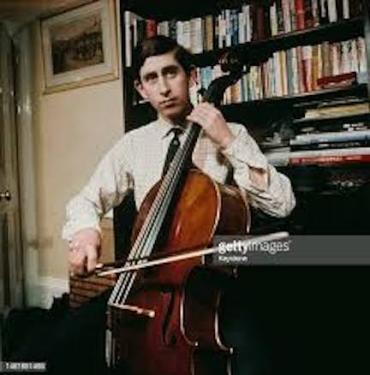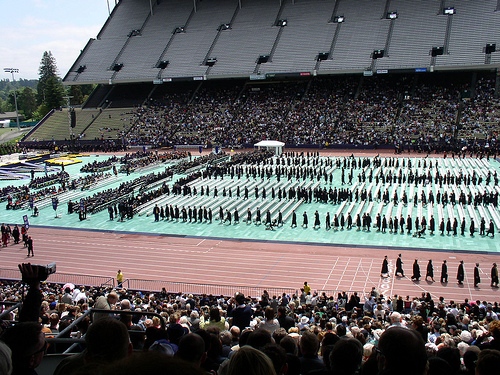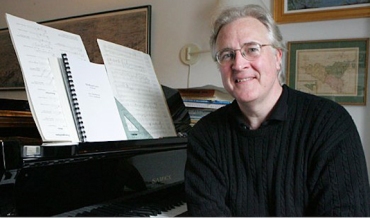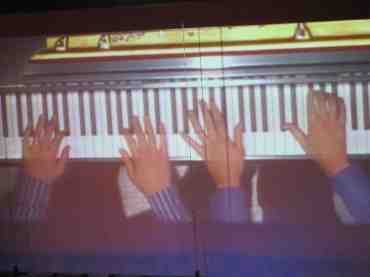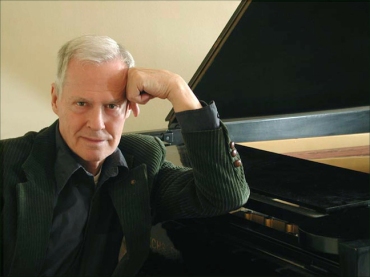The Well-Tempered Ear
Here are the coronation playlists for the very musical King Charles III
6 Comments
PLEASE HELP THE EAR. IF YOU LIKE A CERTAIN BLOG POST, SPREAD THE WORD. FORWARD A LINK TO IT OR, SHARE IT or TAG IT (not just “Like” it) ON FACEBOOK. Performers can use the extra exposure to draw potential audience members to an event. And you might even attract new readers and subscribers to the blog.
By Jacob Stockinger
Will you watch and follow the coronation of King Charles III (the official royal logo is below)? It takes place this Saturday, May 6, 2023. Live coverage will begin airing at 5 a.m. EDT for most media outlets.
Here is some other information you might want to know to get the most out of the rarely held historic event and even to act as your own music and culture critic.
As Prince of Wales, Charles was an avid listener and a talented amateur musician who played the piano, guitar and cello (below in a photo by Getty Images).
Given that background, it is little wonder that the king has lined up many royal commissions for the coronation by composers and performers of new classical music:
https://www.royal.uk/coronation-music-commissions
And if you want to celebrate the coronation in a more pop music or rock music way — yes to The Beatles and Harry Styles but no to The Rolling Stones and Elton John — here is another playlist on Spotify by “DJ” King Charles (below):
Her is the official coronation website, with photos, bunting designs and even recipes to download:
https://coronation.gov.uk/toolkit/
Finally here is a half-hour preparatory YouTube video, an introduction from NBC:
Tags: #AmateurMusician, #BlogPost, #BlogPosting, #FacebookPost, #FacebookPosting, #NBCNews, #RoyalCoronation, #YouTubevideo, amateur, Arts, audience, avid, Baroque, blog, bunting, celebrate, Cello, Chamber music, Charles, choral music, Classical music, Cliburn Watch Party, commission, commissioned music, composer, Concert, coronation, coverage', critic, culture, design, DJ, Early music, Elton John, England, event, Facebook, follow, food, Great Britain, guitar, Harry Styles, historic, History, home website, introduction, Jacob Stockinger, Johann Sebastian Bach, King, King Charles III, link, live, live streaming, logo, Madison, media, Music, NBC, official, Orchestra, performer, photo, photograph, Piano, pop, pop music, preparation, preparatory, Prince of Wales, recipe, Rock, rock 'n roll, rock music, royal, Savannah Guthrie, share, Spotify, symphony, tag, talent, The Beatles, The Ear, The Rolling Stones, The U.K., U.K., UK, United States, Violin, vocal music, watch, Website, Wisconsin, YouTube
TONIGHT at 7:30 the UW-Madison offers free but conflicting online concerts of opera and percussion music
1 Comment
PLEASE HELP THE EAR. IF YOU LIKE A CERTAIN BLOG POST, SPREAD THE WORD. FORWARD A LINK TO IT OR, SHARE IT or TAG IT (not just “Like” it) ON FACEBOOK. Performers can use the extra exposure to draw potential audience members to an event. And you might even attract new readers and subscribers to the blog.
By Jacob Stockinger
Tonight – Tuesday, Nov. 24 – at 7:30 p.m. the University of Wisconsin’s Mead Witter School of Music will offer two FREE but competing events online.
You would think with so many empty spots in the events calendar due to the coronavirus pandemic that such conflicts could be avoided.
In any case, whichever concert you choose to watch – or perhaps to toggle back and forth between the two – here are the details:
OPERA SCENES
The first concert, done by University Opera, is Opera Scenes.
According to the website description: “What was to be Opera Workshop’s Fall Opera Scenes program has morphed in a delightful way.
“This term, each singer undertook an in-depth study of one particular operatic role. We’ll be presenting the fruits of that study – excerpted recitatives and arias from The Coronation of Poppea, Don Giovanni and Orfeo ed Euridice – staged in each student’s adapted habitat, and filmed by the students themselves.”
Here is the program with specifics about the singers and the selections as well as other aspects such as direction and accompaniment:
UW-Madison Opera Workshop: Professors Mimmi Fulmer, Thomas Kasdorf and University Opera head David Ronis (below) are the directors; William Preston and Molly Schumacher are the TAs.
“Batti, batti” and “Vedrai carino” from “Don Giovanni” by Wolfgang Amadeus Mozart
Zerlina: Maria Steigerwald
Directors: Molly Schumacher and David Ronis
Pianist: William Preston
“Chiamo il mio ben così” and “Che farò senza Euridice” from “Orfeo ed Euridice” by Christoph Willibald Gluck
Orfeo: Emily Quartemont
Director: David Ronis
Pianist: Thomas Kasdorf
“Or sai chi l’onore” and “Non mi dir” from “Don Giovanni” by Wolfgang Amadeus Mozart
Donna Anna: Sachie Ueshima
Director: Mimmi Fulmer
Pianist: Thomas Kasdorf
Excerpts from Act I, Scenes 3, 4, and 10 from “L’incoronazione di Poppea”by Claudio Monteverdi. (Below is a photo by Michael R. Anderson of a previous fully staged production in 2018 by University Opera of the Monteverdi opera.)
Poppea: Molly Schumacher
Director: Mimmi Fulmer
Pianist: William Preston
Here is a direct link to the one-hour production: https://www.youtube.com/watch?v=ANcPY9sLGls
UW CHAMBER PERCUSSION ENSEMBLE
Also tonight is a concert by the UW-Madison Chamber Percussion Ensemble (below), directed by Anthony Di Sanza and Thomas Ross.
It takes place in the Mead Witter Foundation Concert Hall of the Hamel Music Center, and will run from 7:30 p.m. to 9 p.m. No in-person attendance is allowed.
The UW-Madison Chamber Percussion Ensemble is dedicated to the performance of significant and engaging works for the Western percussion ensemble tradition. Repertoire from diverse trends in 20th and 21st century chamber composition is explored with an emphasis on new compositions for percussion.
Here is a direct link to the live-streamed concert, with more information about the program and the names of the players if you click on “Show More”: https://youtu.be/iZKO8pZmomA
And here is the program of the mostly new music:
Living Room Music (in the times of Covid) (1940) by John Cage and heard in the YouTube video at the bottom.
I. To Begin
II. Story
III. Melody
IV. End
Spanesque Oscillations (2003) by Steve Riley
For High Hats (2017) by Matt McBane
INTERMISSION
Marimbaireachd (1997) by Matthew Welch
The Lonelyness of Santa Clause (1994) by Fredrik Andersson
Metric Lips (1988) by Bela Fleck (arr. Steinquest)
Tags: #20thCentury, #21stCentury, #AnthonyDiSanza, #BaroqueComposer, #BaroqueMusic, #BaroqueOpera, #BelaFleck, #BlogPost, #BlogPosting, #ChamberMusic, #ChamberPercussionEnsemble, #ChristophWillibaldGluck, #ClaudioMonteverdi, #CollaborativePianist, #ConcertProgram, #CoronavirusPandemic, #COVID-19, #DavidRonis, #DonGiovanni, #EmperorNero, #FacebookPost, #FacebookPosting, #FacultyMember, #FredrikAndersson, #HamelMusicCenter, #HighHats, #JacobStockinger, #JohnCage, #LivingComposers, #LivingRoom, #LivingRoomMusic, #MarimbaMusic, #MatthewWelch, #MattMcBane, #MeadWitterFoundationConcertHall, #MeadWitterSchoolofMusic, #MetricLips, #MimmiFulmer, #ModernComposers, #Musicfaculty, #NewMusic, #OnlineConcert, #OperaAria, #OperaMusic, #OperaScenes, #OperaticRecitative, #OrfeoedEuridice, #PercussionMusic, #PianoAccompanist, #SantaClause, #SopranoSinger, #SteveRiley, #TheCoronationofPoppea, #TheEar, #TheUW, #ThomasKasdorf, #ThomasRoss, #Tuesdaynight, #UniversityOpera, #VirtualConcert, #VocalMusic, #WilliamPreston, #WolfgangAmadeusMozart, #YouTubevideo, 2018, 20th-century, 21st century, ;ik, accompany, act, adapted, allow, Anthony Di Sanza, Arts, audience, avoid, Baroque, begin, Bela Fleck, blog, calendar, Chamber music, Christoph Willibald Gluck, Classical music, Claudio Monteverdi, competing, composer, compositions, Concert, conflict, coronation, coronavirus, David Ronis, dedicate, description, details, director, diverse, Don Giovanni, Early music, emphasis, empty, end, engaging, event, Facebook, Facebook post, Facebook posting, faculty, fall, forward, Fredrik Andersson, Gluck, habitat, Hamel Music Center, high hats, in person, in-depth, Jacob Stockinger, John Cage, like, lips, living composers, living room, Living Room Music, lonely, Madison, marimba, Matt McBane, Matthew Welch, Mead Witter Foundation Concert Hall, Mead Witter School of Music, melody, metric, Mimmi Fulmer, modern, Monteverdi, morph, Mozart, Music, music faculty, Nero, new, New Music, online, opera, Opera aria, opera scenes, operatic, Orfeo ed Euridice, oscillations, pandemic, percussion, Percussion music, performer, Pianist, Piano, Piano accompanist, Poppea, post, posting, previous, production, professor, program, recitative, repertoire, repertory, role, run, Santa Clause, scene, selection, share, significant, singer, soprano, specifics, spot, stage, staged, Steve Riley, story, Student, study, tag, The Coronation of Poppea, The Ear, Thomas Kasdorf, Thomas Ross, toggle, tonight, tradition, trend, Tuesday, United States, University of Wisconsin-Madison School of Music, University of Wisconsin–Madison, University Opera, UW, UW-Madison, virtual, virtual concert, vocal music, watch, Western, William Preston, Wisconsin, Wolfgang Amadeus Mozart, works, YouTube, Zelina
Classical music: University Opera’s “Poppea” proves engaging, satisfying and timely. Performances remain this afternoon at 2 and Tuesday night at 7:30
Leave a Comment
IF YOU LIKE A CERTAIN BLOG POST, PLEASE FORWARD A LINK TO IT OR, SHARE or TAG IT (not just “Like” it) ON FACEBOOK. Performers can use the extra exposure to draw potential audience members to an event.
By Jacob Stockinger
Larry Wells – who is The Opera Guy for The Well-Tempered Ear blog – went to the recent production of the University Opera and filed this review, with rehearsal photos of students, who alternate roles in different performances, by Michael R. Anderson.
By Larry Wells
The only other time I attended a performance of Claudio Monteverdi’s “The Coronation of Poppea” (1643) was in the early 1980s at The San Francisco Opera. Despite the appearance of Tatiana Troyanos as Poppea, I remember being baffled by both the static nature of the music and the grandness of the production of what seemed should be an intimate opera.
That memory, in addition to my being a fan of 20th-century music, made attending the opening performance of University Opera’s performance Friday evening fraught with foreboding.
Despite the production being a lengthy three hours, I must praise the ensemble and director David Ronis — who never disappoints — for keeping my attention throughout the evening as I witnessed an intimate retelling of the passion between Nero and Poppea (portrayed below by Benjamin Hopkins and Anja Pustaver).
The opera was staged in Music Hall on a semicircular platform with the small instrumental ensemble directly to the front side of the audience. Stunning lighting and beautiful costumes made up for the minimal set. I was seated in the center of the first row of the balcony and must say that the sightlines and the sound were superb, even though it was very hot up there. (Below is the coronation scene with Hopkins and Pustaver in the center.)
The ensemble was conducted by Chad Hutchinson (below) whom I had heard conduct the UW Symphony Orchestra the night before in a rousing Tchaikovsky’s Fifth Symphony. The plucked instruments – harp, guitars, theorbo (I had to look it up, too) and harpsichords – were the backbone of the accompaniment. Strings and recorders completed the orchestra, and they were a delight to the ear – totally delicate and restrained.
The plot of the opera involves love triangles and political intrigue. The supertitles created by David Ronis (below, in a photo by Luke Dalalio) were amusing and colloquial. So much of the political posturing by Nero, whose main motivation is consistently self-interest, seemed to be pertinent to our time.
Nero was sung by countertenor Thomas Aláan who has a voice of great agility and expressiveness. His lover, Poppea, who yearns to be his empress, was sung by Talia Engstrom. Hers is a voice of great suppleness and flexibility. Throughout the evening she acted and sang with great subtlety, and I admired her performance very much.
I had been primed for the opera’s very final duet (heard in the YouTube video at the bottom) to be the most sublime moment of the opera, but I was much more aroused by the farewell duet between Nero and Poppea toward the end of the first act. It was highly charged vocally and erotic in its beauty and delivery.
Other characters included Seneca, portrayed by bass Benjamin Galvin (below left front, surrounded, from left to right, by Eliav Goldman, Jack Innes, Jiabao Zhang, Jake Elfner and Noah Bossert.) The lower range of his voice is profound and impressive.
Kevin Green (below right with Pustaver) portrayed the hapless Ottone, and his baritone voice shows promise.
It was, however, a night for the female singers. Cayla Rosché’s Ottavia was beautifully sung. She was completely believable as the spurned wife of Nero. Likewise Kelsey Wang’s Drusilla, Ottone’s second choice, was also wonderfully sung.
In the first scene we were introduced to Fortuna, Virtù and Amore who shone vocally. Throughout the remainder of the opera they silently hovered in the background as visual reminders of the forces driving the plots. Love, portrayed by Emily Vandenberg, eventually triumphed and got to sing a bit more.
There were moments of humor sprinkled throughout the production. I do not know how historically informed they were, but they did help to lighten the heaviness of the political intrigue and amorous complexities.
Some were perhaps unintentional – particularly the absurdly amusing wig that Fortuna wore. But Professor Mimmi Fulmer, in the small role as Nutrice, had a moment of complete hilarity. Her performance – both vocally and as an actress – underlined the contrast between earnestly serious, focused students and a relaxed, confident professional. (Below is the final scene with Nero and Poppea).
Altogether, it was a surprisingly engaging evening. There remain chances to see it this afternoon and Tuesday evening. It is not a brief or light evening of entertainment, but it is wholly engaging, thought provoking, timely and certainly something out of the ordinary.
Two more performances take place in Music Hall: today at 2 p.m. and Tuesday night at 7:30 p.m. For more information including how to get tickets – adults are $25, seniors are $20 and students are $10 — go to: https://www.music.wisc.edu/event/university-opera-monteverdis-the-coronation-of-poppea/
Tags: #20thCentury, #AncientRome, #BaroqueComposer, #BaroqueMusic, #BaroqueOpera, #BlogPost, #BlogPosting, #ChadHutchinson, #ClaudioMonteverdi, #DavidRonis, #EarlyBaroque, #EmperorNero, #FacebookPost, #FacultyMember, #FemaleSingers, #FirstAct, #GuitarMusic, #HarpMusic, #HarpsichordContinuo, #LarryWells, #LoveTriangle, #MichaelR.Anderson, #MimmiFulmer, #ModernMusic, #MusicHall, #MusicReview, #NewMusic, #OperaReview, #OurTime, #OutoftheOrdinary, #PeterIlyichTchaikovsky, #PluckedInstruments, #PoliticalIntrigue, #RecorderMusic, #SanFrancisco, #SanFranciscoOpera, #SightLines, #StringMusic, #Sundayafternoon, #TatianaTroyanos, #TheCoronationofPoppea, #TheOperaGuy, #theorbomusic, #TheWell-TemperedEar, #ThoughtProvoking, #Tuesdaynight, #UniversityofWisconsin-Madison, #UniversityOpera, #VocalMusic, #YouTubevideo, accompaniment, actress, afternoon, agility, amorous, amusing, Ancient Rome, Arts, backbone, balcony, baritone, Baroque, bass, beauty, brief, California, Chad Hutchinson, Chamber music, Classical music, Claudio Monteverdi, colloquial, composer, conductor, contrast, coronation, costumes, countertenor, David Ronis, delicate, delight, delivery, director, duet, ear, early Baroque, Early music, earlymusic, earnest, Emperor Nero, empress, engaged, engaging, ensmeble, Entertainment, erotic, evening, expressiveness, Facebook, faculty, faculty member, female, female singers, first act, flexibility, foreboding, fortune, grandness, guitar, harp, harp music, harpsichord, hilarity, historical, Historically informed performance, historically informed performance practices, hot, Humor, impressive, informed, intimate, Jacob Stockinger, Larry Wells, lengthy, light, lighting, link, Love, love triangle, lover, Madison, Michael R. Anderson, Mimmi Fulmer, minimal, modern, modern music, moment'duet, motivation, Music Hall, music review, nature, Nero, New Music, opera, Opera review, Orchestra, ordinary, out of the ordinary, Passion, performance, pertinent, Peter Ilyich Tchaikovsky, photo, plot, plucked instruments, political, political intrigue, Poppea, production, professional, professor, profound, provocative, recorder, rehearsal, restrained, rousing, scene, self-interest, Seneca, serious, set, share, sing, singer, Sound, stage, staged, static, strings, students, subime, Sunday, sung, superb, supertitles, suppleness, symphony, tag, The Coronation of Poppea, The Opera Guy, The Well-Tempered Ear, theorbo, thought provoking, time, Tuesday, United States, University of Wisconsin-Madison School of Music, University of Wisconsin–Madison, University Opera, UW, UW-Madison, Viola, Violin, virtue, vocal, vocal music, voice, wife, wig, Wisconsin, witness, YouTube
Classical music: Celebrate Commencement Day 2018 with Brahms and Elgar
4 Comments
By Jacob Stockinger
Today is The Big Day – Graduation or Commencement Day 2018 — at the University of Wisconsin-Madison.
The weather may be too rainy and too cold, but there is little choice as an alternative to the huge outdoor ceremony for thousands of graduates, plus friends and family, at Camp Randall Stadium (below) unless there is lightning or dangerous weather that could delay and cancel the ceremony.
Still, there is some great music to celebrate with and perhaps warm up with.
If you have a favorite suggestion for graduation music, leave the name of the composer and work, along with a link to a YouTube video if possible, in the COMMENT section below.
In the mean time, here are the two most famous works that will perhaps stir you or even warm you.
First is the Academic Festival Overture, which uses a student drinking song, that was composed by Johannes Brahms when he received an honorary degree.
And what would any graduation be without the traditional old standby that still never fails to touch most of those who hear it: the stately Pomp and Circumstance No. 1 — one of five composed and then used for a royal coronation –by Sir Edward Elgar
Congratulations to the Class of 2018.
This post is for you.
Tags: #AcademicFestivalOverture, #BritishComposers, #CampRandall, #CampRandallStadium, #CommencementDay, #EdwardElgar, #EnglishMusic, #GraduationDay, #JohannesBrahms, #LeonardBernstein, #MarchMusic, #RoyalCoronation, #TheRoyals, #TraditionalMusic, #UnitedKingdom, #UniversityofWisconsin, #UniversityofWisconsin-Madison, 2018, Arts, Camp Randall Stadium, Cello, Classical music, cold, commencement, composer, coronation, danger, dangerous, drink, drinking, Elgar, Family, favorite, friend, graduation, honorary degree, huge, Jacob Stockinger, Johannes Brahms, lightning, Madison, march, Music, name, Pomp and Circumstance, rain, rainy, royal, sing, song, Student, symphony, tradition, traditional, UK, United Kingdom, United States, University of Wisconsin-Madison School of Music, University of Wisconsin–Madison, weather, work, YouTube
Classical music: The third and final week of the Bach Dancing and Dynamite Society’s 26th season offers vocal music, four-hand piano music and instrumental chamber music of four centuries plus a Midwest premiere
1 Comment
By Jacob Stockinger
Building on the success of the past two weekends and previous four programs, the Bach Dancing and Dynamite Society chamber music festival, which features top local and guest performers, concludes its season this weekend with a typically eclectic mix of vocal and instrumental music that ranges from the late 18th century up to today, including a Midwest premiere.
As usual, the BDDS venues are suitably intimate for chamber music: The Playhouse (below top) at the Overture Center at 201 State St.; the jewel box historic Stoughton Opera House (below middle) at 381 East Main St.; and Frank Lloyd Wright’s Hillside Theater (below bottom) at Taliesin on County Highway 23 in Spring Green.
Concerts are spiked with stories about the music, mystery guests and even door prizes.
This season’s theme is Alphabet Soup, because it’s BDDS’ 26th year and there are 26 letters in the alphabet. Each program is named after a combination of letters used in everyday language. Sometimes the musical interpretation of those letters is literal and sometimes it’s quite loose.
The final weekend of concerts welcomes back audience favorites Hye-Jin Kim, violin; Ara Gregorian, viola; Randall Hodgkinson, piano (below top); and Timothy Jones, bass-baritone (below bottom).
They are joined by the acclaimed local violinist Soh-Hyun Park Altino (below top), a new member of the UW-Madison music faculty, and by Madison Symphony Orchestra cellist Madeleine Kabat (below bottom, in a photo by Christian Steiner), who is filling in for UW-Madison professor and Pro Arte Quartet cellist Parry Karp, who has sustained a finger injury.
“Cs the Day” includes the Midwest premiere of “Cool Fire” for flute, string quartet and piano by Paul Moravec (below), and Mozart’s “Coronation Piano Concerto” arranged for the entire ensemble.
Timothy Jones will be featured in the song cycle, “Let Us Garlands Bring” by Gerald Finzi. These are settings of carpe diem poems of Shakespeare. (Carpe diem is Latin for “seize the day” = “Cs the Day”— get it?) You can hear the songs in the YouTube video at the bottom.
At the center of this program is Carl Czerny’s Sonata in C minor for piano four-hands. BDDS will suspend a camera over the keyboard so the audience can see how the hands of the pianists cross and interlock throughout this virtuosic masterpiece. (Below is a view of a similar set up six seasons ago.)
Cs the Day will be performed at The Playhouse, Overture Center for the Arts on Friday, June 23, at 7:30 p.m.; and Spring Green at the Hillside Theater, Sunday, June 25, at 2:30 p.m.
The final program of the season, “R&B,” features “Rounds for Robin, a short work by Kevin Puts (below top) for flute and piano written in memory of comedian Robin Williams, and the Flute Quintet in G minor by Luigi Boccherini (below bottom).
The “Santa Fe Songs” for baritone and piano quartet by Ned Rorem (below, in a photo by Christian Steiner) features the mesmerizing voice of Timothy Jones in one of the great American song cycles.
The 26th season concludes with Johannes Brahms’ towering Piano Quintet in F minor.
R&B will be performed at The Playhouse, Overture Center, Madison, on Saturday, June 24, at 7:30 p.m.; and Spring Green at the Hillside Theater, Sunday, June 25, and 6:30 p.m.
Photos by Dick Ainsworth of BDDS performances and behind-the-scenes will be on exhibit in The Playhouse through Sunday, July 9.
Single general admission tickets are $43. Student tickets are always $10.
For tickets visit: http://www.overture.org/events/bach-dancing
For more information about the programs, performers, performances and background, visit www.bachdancinganddynamite.org or call (608) 255-9866.
Tickets can also be purchased at Overture Center for the Arts, (608) 258-4141, www.overturecenter.org (additional fees apply).
Tickets are also available at the door at all locations.
Tags: admission, alphabet, alphabet soup, American, arrangement, Arts, Bach, Bach Dancing and Dynamite Society, background, Bard, baritone, bass, BDDS, Boccherini, Brahms, camera, Carl Czerny, carpe diem, Cello, Chamber music, Classical music, comedian, comedy, concerto, coronation, Coronation Concerto, Dane County, day, door prize, eclectic, faculty, festival, Finger, Finzi, flute, four-hands, Frank Lloyd Wright, garland, guest, historic, History, House, injury, instrumental, Jacob Stockinger, Johann Sebastian Bach, Johannes Brahms, Kevin Puts, Keyboard, language, Latin, letters, local, Madeleine Kabat, Madison, Madison Symphony Orchestra, masterpiece, Midwest, Mozart, Music, mystery, Ned Rorem, opera, Overture Center for the Arts, Paul Moravec, performers, Piano, Piano Quartet, Piano Quintet, Playhouse, poem, Poetry, premiere, Pro Arte Quartet, professor, program, quintet, Randall Hodgkinson, Robin Williams, round, rounds, Santa Fe, Season, Shakespeare, sing, singer, Singing, society, Soh-Hyun Park Altino, Sonata, song, song cycle, soup, Spring Green, story, Stoughton, Stoughton Opera House, String quartet, symphony, Taliesin, theater, ticket, Timothy Jones, United States, University of Wisconsin-Madison School of Music, University of Wisconsin–Madison, Viola, Violin, virtuosic, vocal, vocal music, weekend, Wisconsin, Wolfgang Amadeus Mozart, YouTube
Classical music: The Isthmus Vocal Ensemble will mark its 15th anniversary this Friday night and Sunday afternoon with the “German Requiem” by Brahms and the world premiere of a new work commissioned from Andrew Rindfleisch
Leave a Comment
By Jacob Stockinger
The Isthmus Vocal Ensemble (below) will mark its 15th anniversary with two performances this coming weekend of the “German” Requiem by Johannes Brahms and the world premiere of a work by the contemporary American composer Andrew Rindfleisch.
These performances mark the first time the vocal group will be joined by an orchestra.
Performances are in Mills Hall on the UW-Madison campus this Friday, Aug. 5 at 7:30 p.m. and Sunday, Aug. 7 at 3 p.m.
Soloists are soprano Sarah Brailey (below top) and UW-Madison baritone Paul Rowe (below bottom).
Tickets are $20 for adults, $15 for seniors and $10 with a student ID. Children under 6 under should not attend. More information can be found at www.isthmusvocalensemble.org
The Ear asked Scott P MacPherson (below), formerly of the University of Wisconsin-Madison School of Music and now the director of choral activities at Kent State University in Ohio, to talk about the anniversary and concert. MacPherson is the founder and artistic director of the Isthmus Vocal Ensemble.
MacPherson writes:
“We are excited to announce that the Isthmus Vocal Ensemble is celebrating it’s 15th Anniversary with two performances of Johannes Brahms’s Ein deutsches Requiem (A German Requiem) with soloists and professional musicians for the 45-piece orchestra.
“Additionally, IVE marks this significant milestone by presenting the world premiere of the Song of Jubilation, by Andrew Rindfliesch, the native Wisconsin composer’s first choral-orchestral piece.
“Started in 2002, the critically acclaimed Isthmus Vocal Ensemble is Madison’s “temporary” choir—it gathers some of the region’s finest singers every summer for two intensive weeks of rehearsal (below) culminating in two performances on the first weekend of August.
“IVE started up as a summer group of dedicated singers who wanted to perform great choral music together. Many charter members sang under the direction of Robert Fountain in the Concert Choir or with me and the UW Madrigal Singers or Chamber Singers when I was on the UW faculty in the 1980s and 1990s.
“The group has grown from about 35 in its first year to averaging over 60 singers each year. This summer, I have expanded the choir to 115 singers in order to meet the musical and vocal demands of the Brahms German Requiem. (You can hear one of the most popular movements, “How Lovely Is Thy Dwelling Place,” in a YouTube video at the bottom.)
“From the beginning, IVE has served the Madison choral community with excellent performances of a varied and demanding repertoire, from Renaissance and Baroque motets to part songs and motets of the 19th century to choral works either unaccompanied or with piano or organ accompaniment in the 20th century to music by living composers of our time.
“A few years ago, I suggested to the IVE board that we commemorate our 15th anniversary in 2016 by performing a completely different repertoire than our usual fare.
“The Brahms Ein deutsches Requiem immediately came to mind—there wasn’t a doubt in my mind that this would be the right piece to commemorate this milestone. A favorite for the singers and audiences alike, the music of Brahms has frequently been highlighted on IVE’s programs over the years.
“Also, IVE has never before collaborated with an orchestra for an entire concert, although in 2008 we prepared Coronation Anthem No. 2 by George Frideric Handel for Concerts on the Square with Andrew Sewell and the Wisconsin Chamber Orchestra). Performing the German Requiem, arguably Brahms’s finest work, symbolizes the “pinnacle achievement” for many choirs.
I also approached my dear friend composer Andrew Rindflebisch (below), a UW-Madison alumnus who now serves as professor of music and heads the composition program at Cleveland State University, about sharing in our celebration by writing a choral-orchestral piece especially for IVE.
I asked Andy for a brief piece to serve as an opener for the Brahms. Song of Jubilation is a fanfare, a short celebratory anthem of power and beauty. Since it specifically introduces the Brahms, Rindfleisch uses nearly the same instrumentation and even selected one of the texts from the Requiem for his new composition. We are honored and privileged to present the world premiere of this fine work.
Brahms (below) was likely inspired to write his Requiem by the death of his mother in 1865 and possibly also by losing his dear friend Robert Schumann a decade earlier.
In contrast to the Roman Catholic Requiem or Mass for the Dead, which places a great deal of emphasis on the hoped-for salvation of the deceased, Brahms chose a path unheard of in his time: he selected biblical texts in his native German language mostly with themes of consoling the living, comfort in the time of loss, hope, and even a sense of joy for the bereaved for his Requiem.
The resulting 7-movement work quickly became an enduring statement of universal consolation, a “Human” Requiem as Brahms once called it. We hope that not only our dedicated audience members over the years will come and be moved by this incredible music, but that many more new audience members will be there as well.
Tags: A German Requiem (Brahms), accompaniment, Andrew Rindfleisch, Andrew Sewell, anthem, Arts, baritone, Baroque, Brahms, choral music, Classical music, Concert Choir, Concerts on the Square, coronation, George Frideric Handel, Handel, Isthmus Vocal Ensemble, Jacob Stockinger, Johannes Brahms, Kent State University, Madison, madrigal, motet, Music, New Music, Ohio, Orchestra, organ, Paul Rowe, Piano, Renaissance, Requiem, Robert Fountain, Sarah Brailey, song, soprano, symphony, United States, University of Wisconsin-Madison School of Music, University of Wisconsin–Madison, vocal music, Wisconsin, Wisconsin Chamber Orchestra, YouTube
Classical music: Is there better graduation music than the old stand-by, “Pomp and Circumstance” No. 1 by Sir Edward Elgar? The Ear doubts it.
5 Comments
By Jacob Stockinger
This is graduation weekend at the University of Wisconsin-Madison. This year, the biggest ceremonies will be held outdoors in Camp Randall Stadium, as in the photo below.
It started last night, Friday night, with doctoral students, MFA‘s and professional degree students including doctors, lawyers, business people and veterinarians who had their ceremony indoors at the Kohl Center.
Today, Saturday, May 17, 2014, is devoted to the largest number of graduates -– the undergraduates as well as master’s students.
The Ear wants to honor all UW students who are graduating, but especially the students — both undergraduate and graduate — at the University of Wisconsin-Madison School of Music who have brought him so many hours of pleasure and memorable listening.
But what to choose to play?
Believe me, I have thought long and hard about it.
And for the life of me, I still do not think there exists anything better than the old stand-by: The “Pomp and Circumstance’ March No. 1, originally written by Sir Edward Elgar (below) for the coronation of a King of England. (You can hear it in a YouTube video at the bottom.)
Of course, there are other fine marches by Elgar in the same set.
But none surpasses the really famous one, the omnipresent one at this time of year, THE Pomp and Circumstance March that captures the vitality and rush, yet also the dignity and hope of the event — and yes, all the bittersweet sadness of leaving behind close friends and mentors.
If you know of a better musical offering for graduation or commence, please leave a reply or comment with a YouTube link is possible and certainly the composer’s name and work’s title.
In the meantime, here it is again. You have no doubt heard it before probably many times. But no matter that it is a cliché or that is banal. It never fails to give me both goosebumps and tears, and it always makes me wish that I too were among those students processing through commencement.
Are you ready?
Graduates: Please line up, adjust your robe and mortar board, and smile.
Maestro, a downbeat please!
Best wishes and congratulations to all.
Tags: Arts, bachelor's, Camp Randall Stadium, Classical music, Colleges and Universities, commencement, coronation, doctor, Doctor of Medicine, Doctor of Veterinary Medicine, DVM, Education, Edward Elgar, Elgar, graduate, Graduate School, graduation, Jacob Stockinger, JD, King, King of England, knighthood, Kohl Center, law degree, lawyer, master's doctorate, MBA, MD, MFA, musical offering, Orchestra, Pomp and Circumstance Marches, professions, royal, Royal Albert Hall, Student, undergraduate, Undergraduate education, University of Wisconsin-Madison School of Music, University of Wisconsin–Madison, veterinarian, Wisconsin-Madison, YouTube
- May 2024
- April 2024
- March 2024
- February 2024
- January 2024
- December 2023
- November 2023
- October 2023
- September 2023
- August 2023
- July 2023
- June 2023
- May 2023
- April 2023
- March 2023
- February 2023
- January 2023
- December 2022
- October 2022
- September 2022
- June 2022
- May 2022
- April 2022
- March 2022
- July 2021
- June 2021
- May 2021
- April 2021
- March 2021
- February 2021
- January 2021
- December 2020
- November 2020
- October 2020
- September 2020
- August 2020
- July 2020
- June 2020
- May 2020
- April 2020
- March 2020
- February 2020
- January 2020
- December 2019
- November 2019
- October 2019
- September 2019
- August 2019
- July 2019
- June 2019
- May 2019
- April 2019
- March 2019
- February 2019
- January 2019
- December 2018
- November 2018
- October 2018
- September 2018
- August 2018
- July 2018
- June 2018
- May 2018
- April 2018
- March 2018
- February 2018
- January 2018
- December 2017
- November 2017
- October 2017
- September 2017
- August 2017
- July 2017
- June 2017
- May 2017
- April 2017
- March 2017
- February 2017
- January 2017
- December 2016
- November 2016
- October 2016
- September 2016
- August 2016
- July 2016
- June 2016
- May 2016
- April 2016
- March 2016
- February 2016
- January 2016
- December 2015
- November 2015
- October 2015
- September 2015
- August 2015
- July 2015
- June 2015
- May 2015
- April 2015
- March 2015
- February 2015
- January 2015
- December 2014
- November 2014
- October 2014
- September 2014
- August 2014
- July 2014
- June 2014
- May 2014
- April 2014
- March 2014
- February 2014
- January 2014
- December 2013
- November 2013
- October 2013
- September 2013
- August 2013
- July 2013
- June 2013
- May 2013
- April 2013
- March 2013
- February 2013
- January 2013
- December 2012
- November 2012
- October 2012
- September 2012
- August 2012
- July 2012
- June 2012
- May 2012
- April 2012
- March 2012
- February 2012
- January 2012
- December 2011
- November 2011
- October 2011
- September 2011
- August 2011
- July 2011
- June 2011
- May 2011
- April 2011
- March 2011
- February 2011
- January 2011
- December 2010
- November 2010
- October 2010
- September 2010
- August 2010
- July 2010
- June 2010
- May 2010
- April 2010
- March 2010
- February 2010
- January 2010
- December 2009
- November 2009
- October 2009
- September 2009
- August 2009
Archives
- 2,494,151 hits
Blog Stats
Recent Comments
Tags
#BlogPost #BlogPosting #ChamberMusic #FacebookPost #FacebookPosting #MeadWitterSchoolofMusic #TheEar #UniversityofWisconsin-Madison #YouTubevideo Arts audience Bach Baroque Beethoven blog Cello Chamber music choral music Classical music Compact Disc composer Concert concerto conductor Early music Facebook forward Franz Schubert George Frideric Handel Jacob Stockinger Johannes Brahms Johann Sebastian Bach John DeMain like link Ludwig van Beethoven Madison Madison Opera Madison Symphony Orchestra Mead Witter School of Music Mozart Music New Music New York City NPR opera Orchestra Overture Center performer Pianist Piano post posting program share singer Sonata song soprano String quartet Student symphony tag The Ear United States University of Wisconsin-Madison School of Music University of Wisconsin–Madison Viola Violin vocal music Wisconsin Wisconsin Chamber Orchestra wisconsin public radio Wolfgang Amadeus Mozart YouTube
